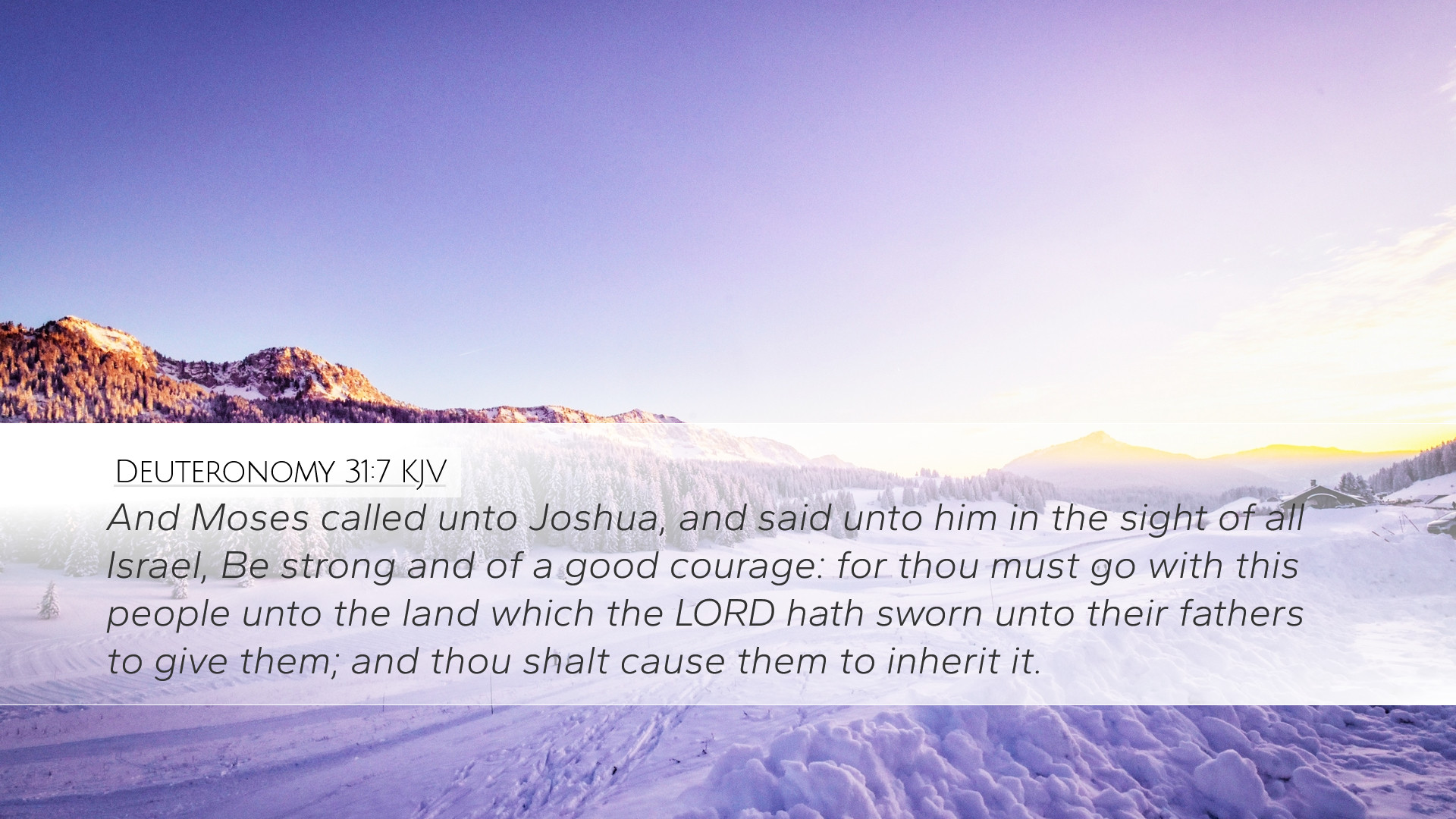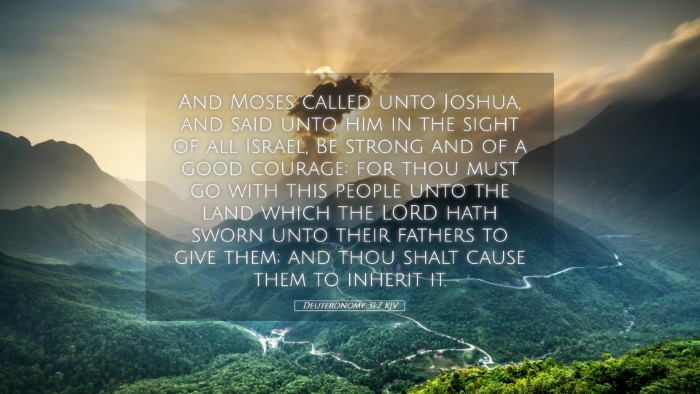Commentary on Deuteronomy 31:7
Verse: "Then Moses summoned Joshua and said to him in the presence of all Israel, 'Be strong and courageous, for you must go with this people into the land that the LORD swore to their ancestors to give them, and you must divide it among them as their inheritance.'" (NIV)
Introduction
This pivotal verse in Deuteronomy serves as a vital transition in the leadership of Israel from Moses to Joshua. In this moment, Moses not only commissions Joshua but also reinforces essential qualities required for leadership—strength and courage. The verse encapsulates themes of divine promise, transition of power, and the responsibilities that come with leadership.
Contextual Analysis
In the wider context of Deuteronomy, we find Moses delivering a series of discourses to Israel before they enter the Promised Land. This book focuses on the importance of covenant faithfulness and the consequences of obedience and disobedience to God's commands. Moses is reminding the Israelites of God’s faithfulness, while also preparing them for the leadership of Joshua.
Significance of the Leadership Transition
The transfer of authority from Moses to Joshua symbolizes a critical moment in Israel's history. Moses, revered as a prophet, lawgiver, and leader, was not to enter the Promised Land due to previous disobedience. His role here is that of a mentor, preparing Joshua for the monumental task that lies ahead.
Moses’ Encouragement to Joshua
Moses’ exhortation to be "strong and courageous" reflects a recurring theme in both the Old and New Testaments where strength and courage are seen as vital for fulfilling God’s commands. In this context, Moses recognizes the daunting challenge Joshua faces as he takes on the mantle of leadership in conquering and distributing the land.
Insights from Commentaries
Matthew Henry’s Commentary
Matthew Henry offers keen insights into the pastoral elements of this verse. He notes that the call for strength and courage stems from the knowledge that the task at hand came from God’s will. He emphasizes that true courage is not simply a matter of the mind; it involves reliance on God's promise and presence. This reliance shapes a leader's character and actions.
- Henry highlights that Moses’ public declaration of Joshua implies recognition of his authority and God’s choice, serving as a confirmation to the people of Israel that they should follow Joshua.
- He also comments on the importance of community in leadership, where Joshua's success would greatly depend on the support and unity of the Israelites as they embark on this new journey.
Albert Barnes’ Commentary
Albert Barnes focuses on the theological implications of Moses’ words. He posits that Moses not only reassures Joshua but reflects God’s assurance that He would be with them as they enter the land. Barnes notes that courage and strength require faith, particularly when leading others into God’s promises.
- Barnes indicates that the "land that the LORD swore" signifies the faithfulness of God to His covenant promises, offering assurance amid uncertainty.
- He succinctly relates the personal qualities of Joshua to the collective success of Israel, suggesting that Joshua’s strength and courage would inspire the people to trust God in their campaigns.
Adam Clarke’s Commentary
Adam Clarke's commentary elucidates the emotional weight of this moment. Clarke describes the significance of Moses’ words as reflective of both a mentor's love and God’s guiding hand. He discusses the psychological burden of leadership that Joshua inherits but emphasizes God’s encouragement through this commissioning ceremony.
- Clarke explains that “strong and courageous” means not only physical bravery but also the moral and spiritual fortitude to uphold God's commands and lead his people effectively.
- Additionally, he points out the importance of Joshua not only in the distribution of land but also in fostering faith among the people by living out the law Moses established.
Theological Themes
Divine Assurance
This verse underscores God’s faithfulness. Moses encourages Joshua by reminding him of God’s previous promises. The assurance of God’s presence is a recurrent theme throughout Israel’s journey, emphasizing that no leader steps into their role alone.
Strength in Adversity
The encouragement to be strong and courageous emphasizes that challenges will arise. The journey ahead is fraught with obstacles, and Moses acknowledges that faith must counter these fears.
Leadership and Community Responsibility
The relationship between Joshua and the Israelites is crucial. As God’s chosen leader, Joshua has a responsibility not just to lead but to embody faith in God. Meanwhile, the community must rally behind their leader, fostering unity and obedience to God’s commands.
Conclusion
Deuteronomy 31:7 serves as a timeless lesson on leadership, courage, faith, and the importance of relying on God’s promises. This verse is not merely a historical reference but a living word that speaks to leaders today, reminding them of their divine call and the inherent challenges they must face. As we reflect on Moses’ commissioning of Joshua, let us be inspired to lead with strength and courage, trusting in the faithfulness of God to guide us through every challenge.


